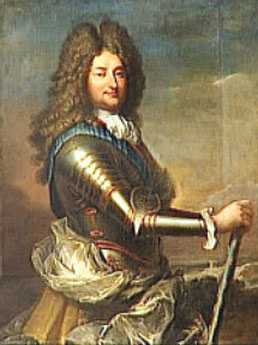| Philippe II, duc d'Orléans  Born: 2-Aug-1674 Born: 2-Aug-1674
Birthplace: Saint-Cloud, France
Died: 2-Dec-1723
Location of death: Versailles, France
Cause of death: unspecified
Gender: Male
Religion: Atheist
Race or Ethnicity: White
Sexual orientation: Straight
Occupation: Royalty Nationality: France
Executive summary: Regent of France, 1715-23 Regent of France, the son of Philip I, duke of Orleans, and his second wife, the princess palatine, was born on the 2nd of August 1674, and had his first experience of arms at the siege of Mons in 1691. His marriage with Françoise-Marie de Bourbon, Mlle. de Blois, the legitimized daughter of Louis XIV, won him the favor of the king. He fought with distinction at Steinkerk, Neerwinden and Namur (1692-95). During the next few years, being without employment, he studied natural science. He was next given a command in Italy (1706) and in Spain (1707-08) where he gained some important successes, but he cherished lofty ambitions and was suspected of wishing to take the place of Philip V on the throne of Spain. Louis XIV was angry at these pretensions, and for a long time held him in disfavor. In his will, however, he appointed him president of the council of regency of the young King Louis XV (1715). After the death of the king, the duke of Orleans went to the parlement, had the will annulled, and himself invested with absolute power. At first he made a good use of this, counselling economy, decreasing taxation, disbanding 25,000 soldiers and restoring liberty to the persecuted Jansenists. But the inquisitorial measures which he had begun against the financiers led to disturbances. He was, moreover, weak enough to countenance the risky operations of the banker John Law (1717), whose bankruptcy led to such a disastrous crisis in the public and private affairs of France.
There existed a party of malcontents who wished to transfer the regency from Orleans to Philip V, king of Spain. A conspiracy was formed, under the inspiration of Cardinal Alberoni, first minister of Spain, and directed by the prince of Cellamare, Spanish ambassador in France, with the complicity of the duke and duchess of Maine; but in 1718 it was discovered and defeated. Dubois, formerly tutor to the duke of Orleans, and now his all-powerful minister, caused war to be declared against Spain, with the support of the emperor, and of England and Holland (Quadruple Alliance). After some successes of the French marshal, the duke of Berwick, in Spain, and of the imperial troops in Sicily, Philip V made peace with the regent (1720).
On the majority of the king, which was declared on the 15th of February 1723, the duke of Orleans resigned the supreme power; but he became first minister to the king, and remained in office until his death on the 23rd of December 1723. The regent had great qualities, both brilliant and solid, which were unfortunately spoiled by an excessive taste for pleasure. His dissolute manners found only too many imitators, and the regency was one of the most corrupt periods in French history.
Father: Philip I, Duke of Orléans
Mother: Elizabeth Charlotte, Princess Palatine (b. 1652, d. 1722)
Wife: Françoise-Marie de Bourbon, Mlle. de Blois (b. 1677, m. 1698, d. 1749)
Son: Louis, duke of Orléans (b. 1703, d. 1752)
Do you know something we don't?
Submit a correction or make a comment about this profile
Copyright ©2019 Soylent Communications
|